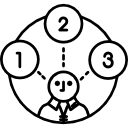Programming: Difference between revisions
Mr. MacKenty (talk | contribs) No edit summary |
Mr. MacKenty (talk | contribs) No edit summary |
||
| Line 7: | Line 7: | ||
* [[What is a programming language?]] | * [[What is a programming language?]] | ||
* [[Output]] | * [[Output]] | ||
* [[Input]] | |||
* [[Variables]] | * [[Variables]] | ||
* [[Constants]] | * [[Constants]] | ||
| Line 55: | Line 53: | ||
* [[Object-Oriented Programming]] | * [[Object-Oriented Programming]] | ||
* [[Working with files]] | * [[Working with files]] | ||
* [[Compiler]] | |||
== References == | == References == | ||
Revision as of 10:50, 17 June 2019

Programming[1]
Introduction to programming[edit]
Programming is the issuing of instructions to a computer. You must learn how to issue instructions to a computer.
Primitive data types[edit]
In computer science and computer programming, a data type or simply type is a classification of data which tells the compiler or interpreter how the programmer intends to use the data. Most programming languages support various types of data, for example: real, integer or Boolean.[2]
The list below describes some of the more common primitive data types
Common data structures[edit]
Control Flow[edit]
In computer science, control flow (or flow of control) is the order in which individual statements, instructions or function calls of an imperative program are executed or evaluated. [3]
Basic program organization[edit]